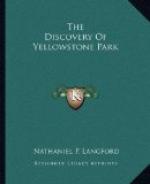Two miles on this side (the north side) of Brown mountain, Washburn and I passed over a low divide, which, I think, must be the main range of the Rocky Mountains, just beyond which is another brimstone basin containing forty or fifty boiling sulphur and mud springs, and any number of small steam jets. A small creek runs through the basin, and the slopes of the mountains on either side to the height of several hundred feet showed unmistakable signs of volcanic action beneath the crust over which we were traveling. A considerable portion of the slope of the mountain was covered with a hollow incrustation of sulphur and lime, or silica, from which issued in many places hot steam, and we found many small craters from six to twelve inches in diameter, from which issued the sound of the boiling sulphur or mud, and in many instances we could see the mud or sulphur water. There are many other springs of water slightly impregnated with sulphur, in which the water was too hot for us to bear the hand more than two or three seconds, and which overflowed the green spaces between the incrustations, completely saturating the ground, and over which in many places the grass had grown, forming a turf compact and solid enough to bear the weight of a man ordinarily; but when it once gave way the underlying deposit was so thin that it afforded no support. While crossing, heedless of General Washburn’s warning, one of these green places, my horse broke through and sank to his body as if in a bed of quicksand. I was off his back in an instant and succeeded in extricating the struggling animal, the turf being strong enough to bear his body alone, without the addition of the weight of a man. The fore legs of my horse, however, had gone through the turf into the hot, thin mud beneath. General Washburn, who was a few yards behind me on an incrusted mound of lime and sulphur (which bore us in all cases), and who had just before called to me to keep off the grassy place, as there was danger beneath it, inquired of me if the deposit beneath the turf was hot. Without making examination I answered that I thought it might be warm. Shortly afterwards the turf again gave way, and my horse plunged more violently than before, throwing me over his head, and, as I fell, my right arm was thrust violently through the treacherous surface into the scalding morass, and it was with difficulty that I rescued my poor horse, and I found it necessary to instantly remove my glove to avoid blistering my hand. The frenzied floundering of my horse had in the first instance suggested to General Washburn the idea that the under stratum was hot enough to scald him. General Washburn was right in his conjecture. It is a fortunate circumstance that I to-day rode my light-weight pack horse; for, if I had ridden my heavy saddle horse, I think that the additional weight of his body would have broken the turf which held up the lighter animal, and that he would have disappeared in the hot boiling mud, taking me with him.




